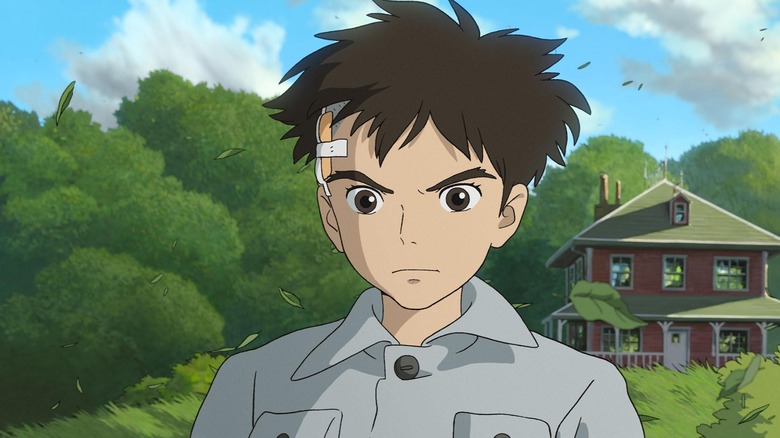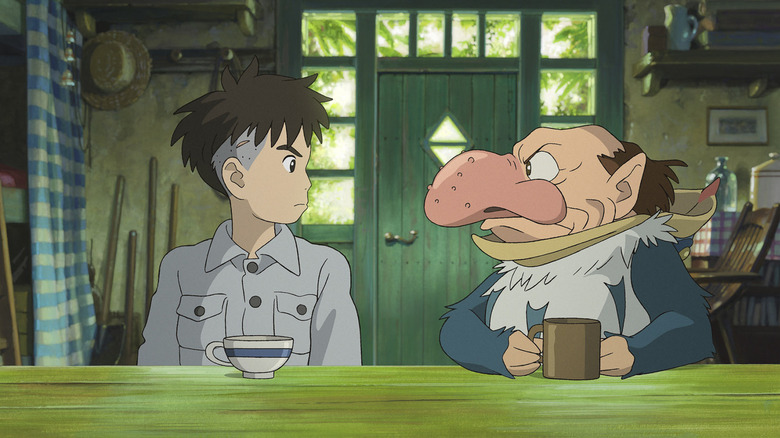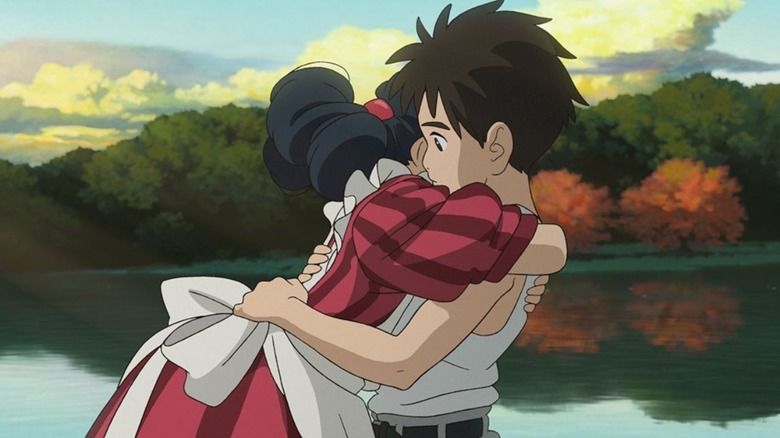The Japanese Title For The Boy And The Heron Is Not Just Different, It Is Essential
Spoilers for "The Boy and the Heron" follow.
Hayao Miyazaki refuses to stop. After threatening to call it quits several times over the years, he broke his 2013 retirement by releasing the 2023 film "The Boy and the Heron." His latest movie may not be his last anymore, but it still serves as the perfect goodbye from one of the greatest animators of all time, and the perfect summary of his body of work.
"The Boy and the Heron" is a semi-biographical story inspired by Miyazaki's own upbringing — as well as his professional relationship with decades-long collaborators Isao Takahata and Toshio Suzuki. Initial reviews for the film praised Miyazaki for combining a personal story with a fantasy adventure. Indeed, the film is so personal that Miyazaki changed the story after Takahata passed away in 2018. Just as the film reaching theaters has a different story than initially thought by Miyazaki, it also has a different title (at least internationally).
The original Japanese title of the film is "How Do You Live?" which it shares with a 1937 novel by Genzaburo Yoshino. The book follows a 15-year-old boy whose father passed away, and who experiences the struggles of growing up while bonding with his uncle. Though Miyazaki has long made it clear that he was only inspired by the title of the book rather than its plot, the choice of that title is integral to the film. Changing the title for the international release loses part of the themes that make this an essential part of Miyazaki's œuvre.
That's because "How do you live?" is the central question asked at every turn in the film. The question that Miyazaki asks himself. The question he leaves the audience with. The question he leaves his grandson with.
How do you live?
Like "How Do You Live?" the book, Miyazaki's latest is all about asking, well, how to live with oneself, and how to "accept a world characterized by conflict and loss" as Taichiro Yoshino, grandson of Genzaburo Yoshino, wrote in an article. It is a question that informs every aspect of the story, starting with its protagonist.
Mahito Maki is a young boy who loses his mother in a fire in Tokyo. Due to the war and that loss, he and his father move to the countryside, where Mahito struggles with his grief. Deciding he doesn't like his new life, Mojito stops on his way back home from school one day and cracks his head open with a rock. In short, he is one messed-up kid. He doesn't know how to live with the death of his mother. Things change after a fantastical journey, sure, but also upon discovering a gift his mother left for him before her death — a copy of "How Do You Live?" the book.
Every character in the film tries to respond to that question differently. The heron seems to desperately try to avoid death and hates the idea of the real world where death exists. Even Mahito's dad copes with his grief by marrying his wife's sister — who looks exactly like her.
By the end of the film, the boy meets his great-uncle and is offered to stay in this fantasy land, which he refuses. Instead, he decides to get back to the real world to face his grief. Given how much the story is about Miyazaki preparing us (and his grandson) for his death, the original title is much better at reflecting this.
The titular boy and heron
So, what about the boy and the heron? Is it just a more marketable title? Not necessarily. When looking at the movie through the lens of Miyazaki's life, the title takes on a different meaning. "How Do You Live?" is not just a question to the audience, but seemingly to Miyazaki himself. Given how he changed the story and reduced the role of the great-uncle after the death of his friend Isao Takahata (who inspired the role), it makes sense he'd look at the title differently, too.
As it stands, "The Boy and the Heron" refers to a boy (Miyazaki) and a being he constantly clashes against, but also shares companionship with, the heron (Suzuki, Miyazaki's producer). The international title, then, is sort of in conversation with the original Japanese one. Referring to Miyazaki and Suzuki, the two surviving members of Studio Ghibli, and how they live now that Takahata is gone, how Ghibli lives with a third of its identity gone. Just like the director and producer now navigate their new reality together, the boy and the heron go from fighting at first (as any director and producer duo is bound to do) to becoming friends who navigate the hellish fantasy world they are trapped in.
When it comes to how Ghibli will live after Miyazaki and Suzuki join Takahata, the answer is that it won't. At least not in the same way we know the studio today. It was announced earlier this year that Studio Ghibli was being sold to Nippon TV, in part because Suzuki and Miyazaki are unable to find and name a successor. Whatever the future of Ghibli and Miyazaki looks like, his latest movie is an encapsulation of the past, present, and future of one legendary filmmaker.


